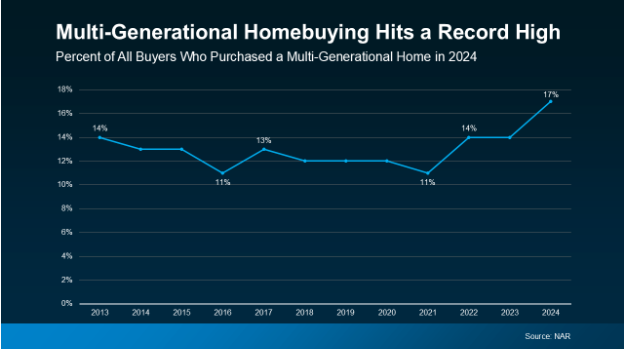Could a Multi-Generational Home Help You Afford Homeownership?

Multi-generational living isn’t just a passing trend but is instead becoming a go-to strategy for today’s homebuyers. According to the National Association of Realtors® (NAR), 17% of buyers purchased a home to share with parents, adult children, or extended family. That’s the highest share ever recorded.
So what’s fueling this shift? In one word: affordability.
NAR reports that “in 2024, a notable 36% of homebuyers cited ‘cost savings’ as the primary reason for purchasing a multigenerational home — a significant increase from just 15% in 2015.”
A decade ago, the top motivation for multi-generational living was usually caregiving, specifically for aging parents who needed support. That’s still important, but with today’s higher home prices and mortgage rates, saving money has officially taken the lead.
Pooling Resources Can Make Homeownership Possible
For many people, the dream of owning a home feels just out of reach, and unfortunately the numbers back that up. Rising home values and interest rates have pushed monthly payments higher, which makes qualifying on your own more difficult.
That’s why more families are coming together to pool their financial resources. By combining incomes, you can qualify for a larger loan, afford a better property, and still have breathing room in your budget. You’re not just sharing a roof, you’re sharing the costs of the mortgage, utilities, taxes, and even maintenance.
And this isn’t just about scraping by either, it can also help you afford more home than you could on your own. That means more bedrooms, more bathrooms, or even space for a home office or in-law suite.
Planning Ahead: Finances and Family
If you’re thinking about buying a multi-generational home, a little financial planning can go a long way. Here are a few tips to help make the transition smoother:
- Set clear expectations early. Decide upfront how the mortgage and other expenses will be split and put it in writing. This avoids misunderstandings down the road.
- Consider everyone’s credit and income. When you apply for a mortgage together, lenders will consider everyone’s finances, so it’s a good idea to check credit scores and debt-to-income ratios beforehand.
- Plan for the long term. Think beyond just buying the home. What happens if someone’s income changes? Or if one family member wants to move out in a few years? A financial advisor can help you plan for these scenarios.
- Work with a knowledgeable lender. Not all loan programs are the same and some may work better for multi-generational households than others. A lender who understands your goals can help you find the right fit.
It’s clear that multi-generational housing is becoming popular again, with nearly 3 in 10 homebuyers saying they’re considering a multi-generational home for their next move.
Could This Be the Right Move for You?
Even with this big step forward, some things remain unchanged: lenders will continue to use data from all three credit bureaus (the tri-merge) for now. Plans to move to a bi-merge system, which would rely on just two bureaus, are currently on hold.
So for now, you don’t need to worry about any big shifts in how your credit is reported. But you might notice lenders offering more flexible options in the months ahead.
Bottom Line
If your budget feels tight, buying a home with family could be a creative, practical way to reach your homeownership goals.
Would you consider teaming up with family to buy a home? Let’s connect and talk through your options. Together, we’ll find the path that works best for your future.
Let’s Chat.
Are you ready to navigate the real estate market with confidence? Contact us today to discuss how you can take advantage of current market opportunities.
Michelle Oddo
Mortgage Wealth Advisor, The Oddo Group
michelle.oddo@goluminate.com
(303) 961-6906

